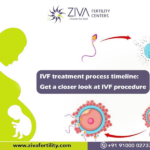Many couples are not aware of secondary infertility. Secondary infertility is defined as the inability to conceive or carry a pregnancy to term after having successfully given birth. After having one biological child, couples assume that everything is fine. So, if they are attempting to have a second child, then they think that it should work just fine. But that is not always the case. Some couples, even after following all the guidelines and trying during the fertility window, also cannot conceive a second child. In some cases, even if they conceive, they cannot go forward with it. In this blog, we will understand the reasons for and remedies for overcoming secondary infertility.
Most sought-out treatments are medications to induce ovulation, in vitro fertilization (IVF), or surgery.
What is secondary infertility?

To be diagnosed with secondary infertility, the earlier childbirth should have been without any external help from fertility medications or treatments, like in vitro fertilization (IVF). Healthcare providers at ZIVA fertility clinics diagnose secondary infertility only if the couple has been trying to conceive for six months to a year.
Is secondary infertility common?
Surprisingly, Secondary infertility cases are more than one can expect. We get these cases just as the primary infertility ones. In the United States, secondary infertility affects about 11% of couples.
How can secondary infertility be identified, and what causes it?
The obvious sign is being unable to get pregnant after having one or more biological children. In the age group younger than 35, your provider may suspect secondary infertility after one year (12 months) of trying to conceive. Trying is defined as having regular, unprotected sex. But if the age group is older than 35, your provider may classify it as secondary infertility after six months of regular, unprotected sex.
Causes of secondary infertility?
Secondary infertility can be caused by either one of the partners. There’s no one cause, and it’s due to multiple factors. The cause of secondary infertility is caused equally by assigned sexes and unknown causes.
Some of the most common causes are:
- Impaired sperm, eggs.
- By the time the couple decides to have more children, they are above 40.
- Medical issues resulting from a previous pregnancy.
- Either of the partners could have undergone surgery, which affects their fertility.
- Poor lifestyle choices such as increased intake of alcohol and smoking.
- The weight has increased to overweight or obese BMI (body mass index).
- Chemotherapy or cancer-related medication.
- Other medical complications such as diabetes, thyroid, and reproductive system issues in either of the partners.
- They may have contracted sexually transmitted infections (STIs).
Causes of secondary infertility in women
- Egg quality and structural problems with your uterus. Women are born with a limited supply of eggs, and as you approach your 40s, the number of eggs left in your ovaries decreases, and the remaining eggs have a higher chance of having chromosomal problems.
- Autoimmune or genetic conditions and prior surgery or radiation also contribute to the reduction of eggs.
- Structural issues like uterine scars or fallopian tube blockages.
- Infections and surgery can damage the uterus or parts of your fallopian tubes. Since the fallopian tube carries the eggs and egg to your uterus. Complications that can block the fallopian tubes are infections like chlamydia, gonorrhoea, and pelvic inflammatory disease (PID).
- Scarring of the uterus during procedures such as dilation and curettage (D&C) or C-section delivery. Uterine fibroids or polyps cause blockages in your uterus, impairing a pregnancy.
- Polycystic ovary syndrome (PCOS) – PCOS is a hormonal condition causing irregular menstrual periods and ovulation issues.
- Endometriosis- Endometriosis is a condition in which tissue growth in your ovaries or other body parts is present, as opposed to inside the uterus.
Causes of secondary infertility in men
- Causes of secondary infertility often include issues with hormone levels, certain medical conditions, and lifestyle factors.
- Reduced testosterone level due to ageing, injury to your testicles, or certain medical conditions such as:
- Genital infections.
- Thyroid diseases.
- Diabetes.
- Tuberculosis.
- Mumps.
- Smallpox.
- Blood diseases.
- Benign tumors.
- Emotional stress.
- Myocardial infarction (heart attack).
- Coma.
- Stroke.
- Respiratory failure.
- Congestive heart failure.
- Burns.
- Sepsis.
Medically low testosterone is known as hypogonadism. Low testosterone is seen often in men over 40 years old.
- Testicular varicocele – It means that the veins in your scrotum, or the sack of skin encasing your testicles, have swollen. Varicocele causes low sperm production and infertility in men — about 30%.
- Poor-quality semen after the age of 40. If there are less than 15 million sperm per millilitre of semen, it is called low sperm count or oligospermia.
- Prostate enlargement can lower sperm count and cause abnormal ejaculation. If the prostate is removed due to cancer or other conditions, it can cause semen to flow backwards.
- Certain drugs, such as antibiotics and medications that treat high blood pressure, affect sperm count and quality. Treatments that can affect sperm quality:
- Prostate cancer.
- Fungal infections.
- Urinary tract infections.
- Ulcerative colitis.
- Arthritis.
- Gout.
- Pain.
- Cancers.
- Seizures.
- Schizophrenia.
- Lifestyle factors or chemicals
- Use natural lubricants that are toxic to sperm, like certain oils and petroleum jelly.
- Being constantly exposed to industrial chemicals, pesticides, lead, and excessive heat can all impact fertility.
- Gaining a large amount of body weight decreases testosterone levels and increases oestrogen levels.
Risk factors for secondary infertility
Your risk for secondary infertility if you’ve had:
Pelvic inflammatory disease (PID) or other STIs.
Irregular menstrual cycles.
Miscarriages.
Low sperm count.
Hormonal imbalances.
Diagnosis and Tests
What to do after getting diagnosed with secondary infertility?
If you are unable to conceive within six months to one year, schedule an exam with your healthcare provider, reproductive endocrinologist or urologist.
We at ZIVA fertility clinics follow the below steps:
- Review your medical history and know if anything has changed since your previous pregnancy.
- Find out about your menstrual cycles and ovulation.
- Perform specific tests, which include:
- A semen analysis.
- Blood tests to check for hormone levels.
- A transvaginal ultrasound.
- A hysterosalpingogram is an X-ray to see your uterus and fallopian tubes.
Management and Treatment options for secondary infertility
Regardless of whether infertility is primary or secondary, treatments are similar and include:
- Medications to induce ovulation in people who aren’t ovulating regularly.
- Intrauterine insemination (IUI), where the sperm is inserted inside your uterus to increase the chance of fertilisation. Donor sperm. It could be used if the male has poor or low sperm.
- In vitro fertilisation (IVF), where the eggs are retrieved from ovaries and manually combined with sperm in a lab for fertilisation.
- Surgery to repair scar tissue, polyps and fibroids.
- Surgery to correct testicular varicocele, which is the most surgically fixed male infertility.
One can certainly hope to get pregnant with secondary infertility. Infertility can take an emotional toll on individuals and partners. Family members and friends should be empathetic and tell them they should be thankful to have one child.
Partners and individuals with secondary infertility may benefit from support groups or a mental health professional.
Please know that Secondary infertility is an actual condition, so if you’re trying for a second child and haven’t been able to, it might be helpful to talk to your healthcare provider. Secondary infertility may not have apparent causes. Still, we at ZIVA fertility clinics will work with you on a treatment plan that matches your desire to expand your family. We are happy to let you know that most people with secondary infertility go on to have a healthy pregnancy. For more information, please visit our website https://zivafertility.com/ or contact us at +91-9100002737 or +91-9392834024.
















